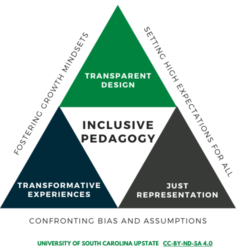
Transformative Experiences are one of the pillars of USC Upstate’s Inclusive Pedagogy Framework – and for good reason. Attending college, like other big moments of transition in our lives, is full of exciting and nerve-racking opportunities for learners everywhere to give an emphatic or shaky yes! to the newness of people, places, and ideas. But how do students get the most out of these opportunities?
Mindset may have a lot to do with it. In Jacob Ham’s short video on survival brain v. learning brain for teachers, he explains that when students experience safety in the learning environment, they are more open to ambiguity, and uncertainty; they may even feel a little “playful”. Similarly, in Harvard’s 2023 Pedagogy of Play text, “playful mindsets” is one of 6 defining pillars of playful learning. A playful mindset “entails finding opportunities for leading, exploring, and enjoying in different contexts” (p. 21). While the book details incredible instances of playful learning in global K-12 classrooms and communities, it also illustrates that play is a state of mind that leads to powerful academic outcomes for learners at all levels. Playful mindsets are essential if we want students to feel empowered to take risks, endure uncertainty, and use their imagination. In college, the need for playful mindsets only increases; playful mindsets allow students to engage “with various challenges related to imagination, innovation, and co-creation…playful learning follows a constructivism approach [encouraging] students [to] be active participants in their learning process and [by] offer[ing] them surmountable challenges to learn while being intrinsically motivated – through learning by doing” (Heljakka, 2023).

These characteristics of playful mindsets may be just what students need to feel open to the many possible transformative experiences college offers. Transformative experiences include any time students take a chance and seek to learn more about themselves, their peers, and the global community; this learning process might include having their assumptions challenged, their beliefs and values questioned or their views expanded. According to AAC&U, diversity and global learning high-impact practices lead to transformative experiences by creating learning conditions in which students “explore cultures, life experiences, and worldviews different from their own.”
A quick review of the course catalog at USC Upstate makes it easy to find academic opportunities in every major where transformative experiences may take place. But transformative experiences aren’t restricted to the classroom and we can direct our students and advisees to the rich array of options available. Joining a student organization, a sports team, or a committee also provides ample opportunities for growth. Participating in service learning or volunteering, completing an internship, or getting involved with an academic center on campus provides avenues for students to develop their leadership skills, build networks and friendships, and consider issues and events from multiple viewpoints or perspectives. And if students are open and ready to move beyond campus, invite them to explore Faculty-Led Study Abroad (Applications due Feb 1, 2024) or ISEP Exchange (Applications due March 1, 2024) possibilities.
Other benefits come from adopting playful mindsets and transformative experiences, as well. In addition to helping us bring the world into greater focus and pinpointing opportunities to step in and contribute openly to the social enterprise, playfulness can also bring us joy, good humor, and hope and has the potential to reduce anxiety, worry, and depression during a time of increased instances of mental illness on college campuses. Those benefits alone make me give transformative experiences and playful mindsets an emphatic yes!
